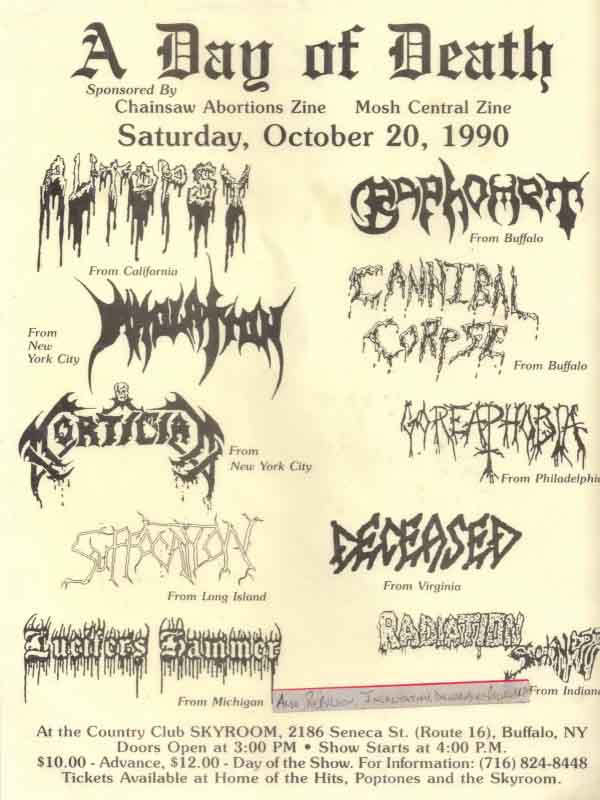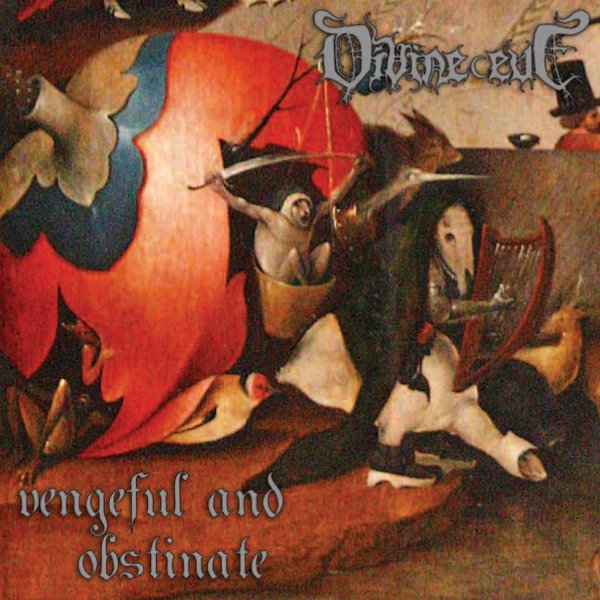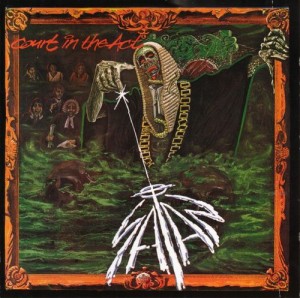Thanks to a reader, who pointed this out:
THIS GUY HATES ALL THE BANDS WE LIKE
At least that’s what some dude at Anus.com (American Nihilist Underground Society, oh ok) would have you believe when he rips into several other well-respected metal bands that we like because, ya know, we like their music: Opeth, Cynic, Baroness, In Flames, Cannibal Corpse and many others.
His arguments against every band basically follow this format:
Band X is stupid because all they did was combine what Band Y and Band Z already did. Their first self-released EP was pretty cool, but after that they sold out. People listen to Band X to appeal to a certain lifestyle, not because they actually like the music, and they’re duped into doing so by superficial musical tricks. Only non-thinking automatons follow this band!
This article smacks of the self-important elitist attitude perpetuated by all-knowing “my taste is scientifically provable as ‘good’ music” message board trolls like Ziltoid. – MetalSucks.net
Well, it’s nice to have someone understand us. There’s two basic takes on life, music and everything: either there’s one reality and so there’s some standard of behavior, or everything is arbitrary and hey whatever you want is cool, man.
We’re from the “objective reality exists” camp, which Vince Neilstein alludes to with “my taste is scientifically provable as ‘good’ music.” Some music is just dumb; if you respect yourself, you owe something better to yourself. Your time is valuable.
It’s not a matter of intellekshual cogitation, either. Music is experienced at the level of the nerves, and plays directly with our emotions. But like anything in our world, we can analyze it and realize that if it’s vapid, we’re conditioning our brains to be stupider.
But here’s our basic review format for bands we don’t like, since Vince’s take was a little bit off:
Band X offers nothing unique stylistically or in content. In fact, it’s a derivation of known successes, but dumbed down so that more people will think they like it, not knowing better. Like good advertising, or the sermons of televangelist, it preaches to your weakness and not your strength. Feeling bad about yourself, you’ll comfort yourself with this insipid music, which appeals to a certain demographic which has weakness Y. If you listen to this, you’re going to make your life more miserable under the guise of enjoying it.
Let’s look at that for the favorite target around here, which is ARE YOU TALKIN TO ME? — sorry, I meant “Pantera”:
Pantera rips off the aesthetic style of Exhorder, Exodus, and Prong, and mixes it into the same Metallica-derivative crap they put out with Cowboys From Hell. That in itself would be bad, except this is music that dumbs down life into a few emotions: self-pity, righteous anger, and a desire to get loaded. Like a commercial for watery beer, it’s there to convince you that if your life sucks, a few cold ones and some tits swingin’ by in the breeze will make everything alright. Never mind that when you sober up, your life still sucks. But this album is basically Lady Gaga with guitars. It’s catchy, songs go nowhere, and it leaves you right where you started. People like it because it appeals to the psychology that says “Life has done me wrong and I want to be angry about it, but not really fix it.” As a result, this band mainly appeals to AOR fans with frustrating lives who want to claim they let loose on the weekends.
It’s not as far-fetched as Vince might think that what music we like is determined by our needs. If you respect yourself, and take yourself seriously, you’re going to want the most high-intensity stuff you can find. If you hate yourself, you’re going to want music that panders to you like a prostitute, tells you it’s not your fault, and lets you vent some very simple emotions before returning you to work the next day.
We intellectualize music here because we’re geeks — we love to read, program computers, climb mountains, build stuff, shoot guns and talk about philosophy. That’s our medium for understanding music and everything else. But we like any music that’s good, meaning it has a presence and something to communicate; we don’t like music that panders to our weaknesses under the guise of empowering us.
I do agree with this guy’s assessment of Sunn O))), however, so there’s that.
Good man. We think Sunn O))) is hollow plastic trash disguised as profundity so that people can get elitist and tell their friends, “You’re still listening to that low-brow death metal shit? Well I’ve moved up in the world into avant-garde, like this band that uses orchestras and mathematical theories and shit to be all cool. You’re still down there, but I’m up here. I’m fucking profound!”
And this is from people who like Stephen O’Malley and his other projects.
In the meantime, his arch nemesis (or animus?) Ziltoid says this:
As to the ANUS article (ha…”anus”), frankly, it’s not as wrong as you may think. The criticisms of In Flames (especially In Flames…), CoF, Cannibal Corpse, and Necrophagist are spot on and not worded nearly as badly as you make them out to sound. – Ziltoid
At this site, you’ll find lots of praise for At the Gates and Demilich, but also bands that the experts are gonna poo-poo for their simplicity and violence, like Ildjarn, Cianide, Master and Profanatica. We’re not elitists by format or instrumentation, but by the quality of the end product.
And if you’re reading this, I can guarantee that you already believe there’s an objective standard to music. Everyone hates something, whether it’s rap or noise or pop, and will base that opinion in some reason, such as “it’s not music” or “nothing happens.” If you disagreed, you’d be as happy listening to blower noise as the most fantastic metal band ever. Something to think about ;)
No CommentsTags: elitism, MetalSucks

 This is by no means the easiest of films to watch. It has numerous flaws and executions within the film that would provoke one to make immediate criticism, for example the sub-par, almost at times robotic acting and unimaginative script, and what could indeed be labelled a lack of cohesion (could this be due to editing and censoring? I am not sure), Cannibal Holocaust never ceases to shock and provoke, as well as provoke immediate questions of ‘who are the real savages?’ and how people might want to generally assess their modern, non-organic way of living.
This is by no means the easiest of films to watch. It has numerous flaws and executions within the film that would provoke one to make immediate criticism, for example the sub-par, almost at times robotic acting and unimaginative script, and what could indeed be labelled a lack of cohesion (could this be due to editing and censoring? I am not sure), Cannibal Holocaust never ceases to shock and provoke, as well as provoke immediate questions of ‘who are the real savages?’ and how people might want to generally assess their modern, non-organic way of living.
 The most redeeming features of the film are the soundtrack by Riz Ortolani, which utilises rather dated synthesisers alongside a string orchestra, often interspersed with music that sounds not too dissimilar to Italian religous music, with arpeggiated acoustic guitars playing upbeat music that adds a brilliantly sarcastic touch to an otherwise grim and unrelenting series of violent acts. The usage of hand-held camera is very effective. As opposed to films where every scene is portrayed from a multi-angle perceptive, we see absolute realism for the most part, and is done in a non-perfective, improvised fashion that otherwise contributes heavily to making the film for the most part, very convincing. Cannibal Holocaust is flawed, yes. But it is a triumph of the cold, efficient will. Unlike the humoured (but still excellent) Dawn Of The Dead, Cannibal Holocaust is the work of the cynical sociopath, and seems to metaphorically imply that when one reaches or exceeds a certain threshold of excess, be it due to ignorance, lust, greed, self-indulgence etc, there is not even the vaguest chance of redemption. In a sense, the message of this film is an all-out war against the modern way, and the belief that furthering it to those who are otherwise unwilling to accept it is nothing short of a disastrous consequence. The film also suceeds in that it doesnt moralise about the issues it raises, and also leaves the film open to many possible interperatations. Overlooked by critics for its very bad acting, reviled by the politically correct, adored by much of the exploitation crowd, here is a film which holds truths and meanings beyond a framework that would isolate and sicken many.
The most redeeming features of the film are the soundtrack by Riz Ortolani, which utilises rather dated synthesisers alongside a string orchestra, often interspersed with music that sounds not too dissimilar to Italian religous music, with arpeggiated acoustic guitars playing upbeat music that adds a brilliantly sarcastic touch to an otherwise grim and unrelenting series of violent acts. The usage of hand-held camera is very effective. As opposed to films where every scene is portrayed from a multi-angle perceptive, we see absolute realism for the most part, and is done in a non-perfective, improvised fashion that otherwise contributes heavily to making the film for the most part, very convincing. Cannibal Holocaust is flawed, yes. But it is a triumph of the cold, efficient will. Unlike the humoured (but still excellent) Dawn Of The Dead, Cannibal Holocaust is the work of the cynical sociopath, and seems to metaphorically imply that when one reaches or exceeds a certain threshold of excess, be it due to ignorance, lust, greed, self-indulgence etc, there is not even the vaguest chance of redemption. In a sense, the message of this film is an all-out war against the modern way, and the belief that furthering it to those who are otherwise unwilling to accept it is nothing short of a disastrous consequence. The film also suceeds in that it doesnt moralise about the issues it raises, and also leaves the film open to many possible interperatations. Overlooked by critics for its very bad acting, reviled by the politically correct, adored by much of the exploitation crowd, here is a film which holds truths and meanings beyond a framework that would isolate and sicken many.

 nlike many albums of the NWOBHM there is no real incohesion or disruption halting the flow of compositional prowess. Quite an archaic use of notation that makes great use of pentatonics, yet moderates the restraints of blues and R&B music, has something more in common with European music of centuries past. If one were to imagine listening and removing the aesthetics of the modern band-set up, and replacing the electrical distortions of the guitars with perhaps harpsichord or sole acoustic guitar in it’s place a bridge can more or less be established as an imaginative transition to a modern form of music. One of the absolute best releases of traditional metal, this is highly overlooked and highly recommended.
nlike many albums of the NWOBHM there is no real incohesion or disruption halting the flow of compositional prowess. Quite an archaic use of notation that makes great use of pentatonics, yet moderates the restraints of blues and R&B music, has something more in common with European music of centuries past. If one were to imagine listening and removing the aesthetics of the modern band-set up, and replacing the electrical distortions of the guitars with perhaps harpsichord or sole acoustic guitar in it’s place a bridge can more or less be established as an imaginative transition to a modern form of music. One of the absolute best releases of traditional metal, this is highly overlooked and highly recommended.
